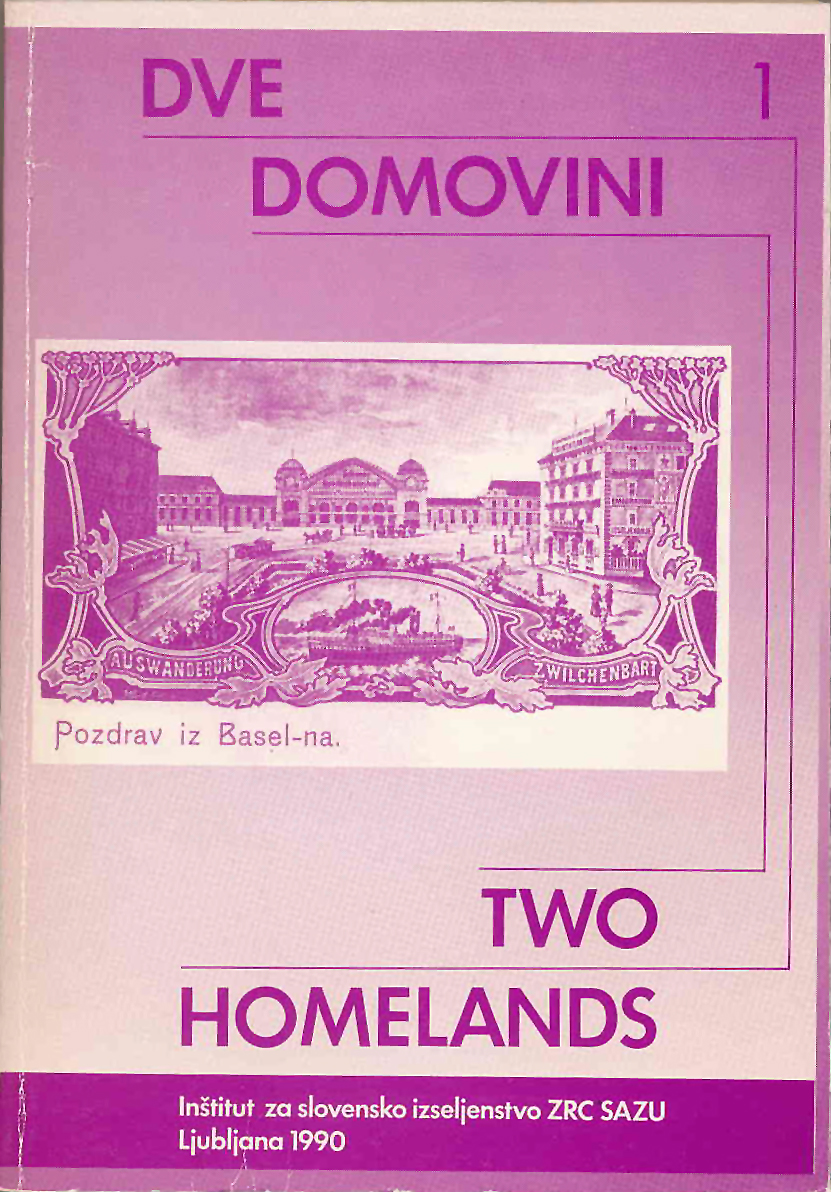Ethnological Research on the Ethnic Identity of Slovene Emigrants
Abstract
The paper treats the issues of researching the ethnic identity of Slovene emigrants as within appeared in the work of seminar for the study of Slovene emigration within the Department of Ethnology. In the process of collecting the materials, in the study of relevant literature and the preparation of seminar and graduate papers, much attention has been given to conventional and methodological questions. New approaches to the understanding of inter-cultural and inter-ethnic relations and dynamic definitions of ethnic identity are characteristics of the constructs produced. In their sophistication, they surpass and refute the stereotypes of emigrant culture.
Less ...
Ethnological research on Slovene emigration within the seminar of the Ethnology Department in the early 1980's has - through collection of materials on emigrants and returnees, through the study of literature on inter-cultural and inter-ethnic relations and through presentation of seminar and graduate papers - indirectly s e t into focus conceptualization of emigrant culture and ethnic identity. Knowledge of global economic, political, social and migrational processes has verified their existence on the so-called micro level, that is in everyday life. On this eminently ethnological level, a level which takes into account historical processes, generational, social, regional and other differences and especially the relationships among individual-community-society-culture, some stereotyped labels, interpretations o f and relations towards emigrant culture can be exposed and overcome. Such a culture need not always have an obligatory ethnic tinge of constant intensity. Ethnicity becomes relevant as a heritage, as an interaction of emigrants with a broader environment and as a latent need to draw lines against it. The original homeland culture or its selected elements are only part of it. Generalizations about the » way of being Slovene« are inadmissible, inasmuch as they disregard specific historical, social, and other implications in the original, homeland, and foreign, emigrant culture. The ethnological contribution concerning the emigrant way of life and emigrant everyday culture, that is, concerning this expressly interdisciplinary phenomenon, also draws attention to functional, manifestative and symbolic expressions of the original life experience o f a domestic culture and to an often hidden, or even unknown homelessness or twin nativity.
Downloads
References
Besedilo predavanja na Etnografskem institutu SANU v Beogradu, 21. 1. 1988.
Mojca Ravnik, Etnološko proučevanje slovenskega izseljenstva na Oddelku za etnologijo Filozofske fakultete v Ljubljani, Glasnik
Slovenskega etnološkega društva, 22/1982, št. 3, str. 62-64.
Slavko Kremenšek, Uvod, Etnološka topografija slovenskega etničnega ozemlja, Ljubljana 1976, str. 1-2.
Frederik Barth, Introduction, Ethnic Groups and Boundaries, The Social Organization of Culture Difference,- ed. F. Barth, Bergen, Universitetsforlaget, 1969.
Network Analysis, Studies in Human Interaction, Jeremy Boissevain, J. Clyde Mitchell, eds., The Hague, Mouton, 1973.
Olga Supek, Etnos u etnologiji i kulturnoj antropologiji, Zgodovinske vzporednice slovenske in hrvaške etnologije 5, Ljubljana, Slovensko etnološko društvo, 1988, str. 29-60.
Downloads
Published
How to Cite
Issue
Section
License

This work is licensed under a Creative Commons Attribution-NonCommercial-NoDerivatives 4.0 International License.
Authors guarantee that the work is their own original creation and does not infringe any statutory or common-law copyright or any proprietary right of any third party. In case of claims by third parties, authors commit their self to defend the interests of the publisher, and shall cover any potential costs.
More in: Submission chapter





